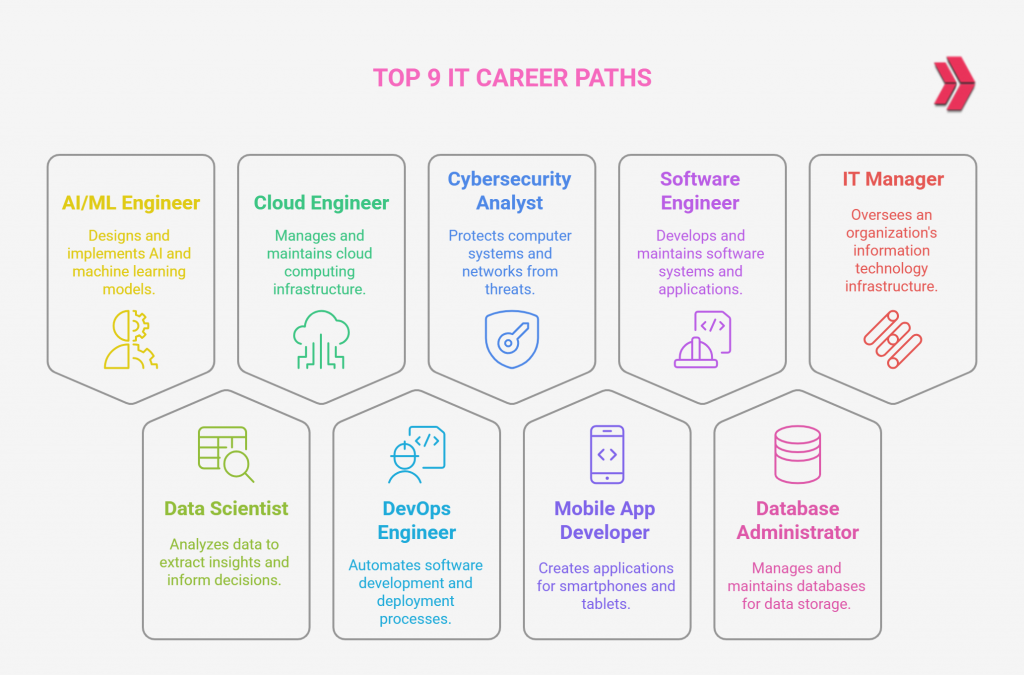The U.S. Bureau of Labor Statistics projects that the demand for computer and information technology jobs will increase by 356,700 openings annually through 2033, far outpacing average growth across other sectors. As businesses continue to rely on technology, skilled IT professionals are in high demand. These roles offer not just financial rewards, but the chance to shape the future of industries worldwide.
In this article, we will help you learn about the top 9 IT career paths in 2025. You will understand the key opportunities in AI, cybersecurity, and more. These roles promise strong career growth, impressive salaries, and long-term job security, and we will guide you on how to prepare for a successful career in these high-demand fields.
What are the Top 9 IT Career Paths in 2025?
Here are the top 9 IT career paths in 2025:
- AI / Machine Learning Engineer
- Data Scientist
- Cloud Engineer
- DevOps Engineer
- Cybersecurity Analyst
- Mobile Application Developer
- Software Engineer
- Database Administrator
- IT Manager

1. AI / Machine Learning Engineer
AI/Machine Learning engineers design and develop systems that allow software to learn from data. This is a highly specialized field, and as more industries adopt AI to enhance efficiency, demand for skilled professionals continues to grow.
Salary Expectations:
- Entry-Level: $75,000 – $100,000 per year
- Mid-Level: $110,000 – $180,000 per year
- Senior-Level: $180,000 – $350,000+ per year
Job Outlook:
AI/Machine Learning engineers are in high demand. The global AI market is expected to reach trillions of dollars in economic impact over the next few years, making this one of the fastest-growing and most lucrative IT career paths.
2. Data Scientist
Data scientists use statistical models, machine learning algorithms, and data visualization tools to extract insights from large datasets. These professionals help businesses solve complex problems by providing data-driven solutions.
Salary Expectations:
- Entry-Level: $60,000 – $90,000 per year
- Mid-Level: $90,000 – $180,000+ per year
- Senior-Level: $150,000 – $300,000+ per year
Job Outlook:
Data scientists are in high demand due to the explosion of big data. The U.S. Bureau of Labor Statistics projects 35% job growth for Data Scientists through 2032. As companies increasingly rely on data for decision-making, data scientists will continue to be crucial.
3. Cloud Engineer
Cloud engineers design, build, and maintain cloud computing systems, typically working with platforms like AWS, Azure, or Google Cloud. With businesses transitioning to the cloud, these roles are more important than ever.
Salary Expectations:
- Cloud Engineer: $90,000 – $150,000 per year
- Cloud Architect: $140,000 – $250,000+ per year
Job Outlook:
The cloud services market is projected to hit $912.8 billion by 2025. As more businesses migrate to cloud solutions, the demand for cloud engineers will continue to rise, making it one of the top IT career paths.
4. DevOps Engineer
DevOps engineers automate and streamline the processes of software development and IT operations. They ensure that code is deployed efficiently and that systems are scalable and reliable.
Salary Expectations:
- DevOps Engineer: $100,000 – $160,000 per year
- Senior DevOps Engineer: $150,000 – $250,000 per year
Job Outlook:
DevOps roles are experiencing strong growth as businesses adopt Agile development and continuous delivery practices. The DevOps market is expected to grow at a 24.2% CAGR from 2021 to 2030, creating numerous opportunities in this field.
5. Cybersecurity Analyst
Cybersecurity analysts protect organizations’ digital infrastructure from cyber threats. With the increasing frequency of cyberattacks, these professionals are more important than ever.
Salary Expectations:
- Entry-Level: $70,000 – $90,000 per year
- Mid-Level: $100,000 – $150,000 per year
- Senior-Level: $160,000 – $250,000+ per year
Job Outlook:
Cybersecurity is one of the most rapidly growing sectors. The U.S. Bureau of Labor Statistics projects a 32% increase in jobs for information security analysts through 2032, driven by the need for businesses to secure their systems and data.
6. Mobile Application Developer
Mobile application developers create apps for mobile platforms like iOS and Android. With mobile device usage continuing to rise, these roles remain in high demand.
Salary Expectations:
- Mobile Developer: $70,000 – $120,000 per year
- Senior Mobile Developer: $120,000 – $200,000+ per year
Job Outlook:
Mobile app development is one of the fastest-growing areas in IT. Global in-app spending is expected to surpass $150 billion in 2024, and mobile developers continue to be highly sought after.
7. Software Engineer
Software engineers design and develop applications that solve business problems or improve processes. They work in multiple languages and frameworks to build and maintain software systems.
Salary Expectations:
- Entry-Level: $65,000 – $95,000 per year
- Mid-Level: $95,000 – $150,000 per year
- Senior-Level: $150,000 – $280,000+ per year
Job Outlook:
Software engineers will always be in demand due to the ubiquity of software across all industries. The Bureau of Labor Statistics predicts 25% job growth for software developers through 2032.
8. Database Administrator
Database administrators are responsible for managing and securing databases. They ensure that data is organized, accessible, and secure, which is crucial as data volumes continue to grow.
Salary Expectations:
- Entry-Level: $60,000 – $85,000 per year
- Mid-Level: $85,000 – $130,000 per year
- Senior-Level: $130,000 – $200,000+ per year
Job Outlook:
As data volumes increase, so does the need for skilled database administrators. While the job growth rate is steady, this is still a critical role for businesses that rely on data.
9. IT Manager
Role Overview:
IT managers oversee the technology strategy and operations of an organization. They are responsible for ensuring that the company’s IT infrastructure aligns with business goals.
Salary Expectations:
- IT Manager: $120,000 – $200,000+ per year
- Senior IT Manager: $180,000 – $300,000+ per year
Job Outlook:
The need for strong IT leadership is growing. As businesses rely more on technology, IT managers are essential for guiding organizations through digital transformation. The job growth for IT managers is projected to be 15% from 2022 to 2032.
Conclusion: Unlock Your IT Career with Clarusway
The IT industry offers incredible opportunities for career growth, with the roles listed above leading the charge in both demand and earning potential. Whether you’re interested in AI, cloud computing, cybersecurity, or software development, the future is bright for IT professionals.
Clarusway provides industry-leading bootcamps to help you gain the skills and certifications needed to launch a successful career in these high-paying IT fields. Ready to take the next step? Explore our programs and start your journey today.
FAQs
Q: Do I need a degree to get an IT job?
No, many roles in IT can be accessed through bootcamps and certifications. Degrees may be preferred for some advanced roles, but not always necessary.
Q: Are IT jobs in demand globally?
Yes, IT professionals are in high demand worldwide, with digital transformation driving the need for skilled workers in every industry.
For more information you can check our article titled “Unlock Your Future: Top 8 In-Demand and High-Paying IT Jobs in 2025”.
Q: How long does it take to get trained for an IT career?
Bootcamps like Clarusway offer intensive programs that can prepare you for an entry-level role in a few months. Traditional degree programs take longer.
For more details on how coding bootcamps can fast-track your IT career, check out our blog post titled “Coding Bootcamps: A Comprehensive Guide”.
Q: How do I know which IT career is right for me?
To find the right IT career, consider your interests and strengths. If you enjoy problem-solving and security, look into cybersecurity. If you’re analytical and enjoy working with data, data science might be a good fit. If you love coding and building systems, software development could be your path. Research different roles, try related projects, and choose the one that excites you most.
For more guidance on choosing the right IT career, read our blog post titled “Which Tech Career Is Right For You?”.
Q: How Do I Start an IT Career?
Start by learning the foundational skills needed for your chosen role. Enroll in a coding bootcamp, pursue certifications, or take online courses to build your expertise. Focus on mastering key technologies and languages required for your role. Gain practical experience through internships, personal projects, or freelancing to build a portfolio and increase your job opportunities.To learn more about how to get started in IT, check out our blog post: “How To Start An IT Career: A Step-By-Step Guide”.




